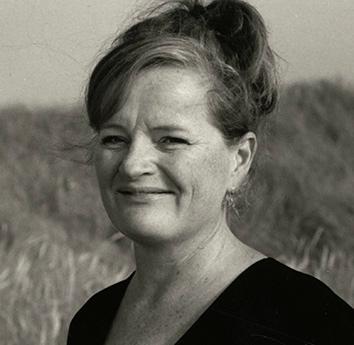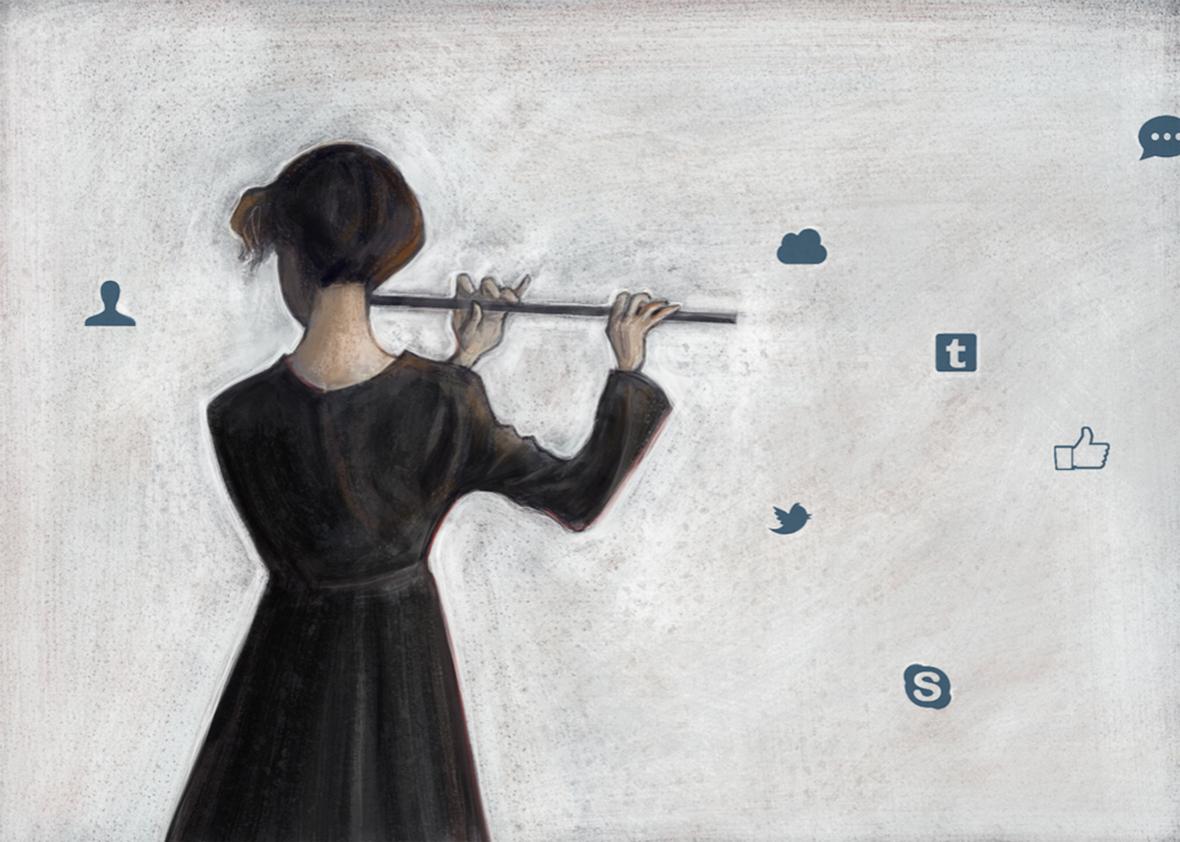“A woman should have room for a flute,” thinks the protagonist of Minna Needs Rehearsal Space, one of two recently translated novellas by the Danish writer Dorthe Nors. “A woman should have room for a flute, a triangle, and a guitar.” The titular Minna is a composer who, in addition to having lost her rehearsal space, can’t strum a single chord in her cramped Copenhagen apartment without eliciting the ire of her next-door neighbor. Instead, she spends her days in a public library, listlessly writing a soundless “paper sonata.” As Nors wryly informs us, “Minna is a tad avant-garde.”
Minna’s predicament, it quickly becomes clear, doubles as an arch metaphor for her quintessentially contemporary life and for the close quarters—real and virtual—that make her feel both stifled and exposed. The second novella in Nors’ new book, So Much for That Winter—titled Days and, like Minna Needs Rehearsal Space, translated sensitively by the Danish-American writer Misha Hoekstra—is an equally postmodern parable: While Minna is a singer and composer who can no longer make a sound, her nameless counterpart is a writer who has lost the ability to order her fragmentary thoughts. Both have been devastated by callous breakups; both are around 40, slipping into middle age, alone with their ambitions amidst the populous blur of Copenhagen’s whizzing bike lanes and buzzing coffee shops.
So Much for That Winter is not only about our hyperconnected yet atomized times but ingeniously of them as well. The novellas are daring formal experiments that simultaneously evoke and critique the feeling of online life: Minna Needs Rehearsal Space is essentially written in Facebook statuses, while Days is comprised of numbered lists. Each story’s stylistic conceit serves as a precisely chosen key that unlocks the riddle of its protagonist’s malaise. In skillfully playing with digital forms, Nors joins writers such as Sheila Heti—who borrowed tropes from reality T.V. and passages from real-life email correspondence for her novel How Should a Person Be—and the poets Patricia Lockwood and Melissa Broder, Twitter celebrities whose verse reflects that platform’s sardonic confessionalism. Like any work concerned with urbanity and technology, Nors’ novellas must consider how these forces have refracted the human experience. She answers, however, with a rare, poignant optimism: Her cyber-inspired forms look and feel on the page like narrative poetry, and her small epics insist that our efforts to find happiness and make art—even in the bleary, dulling space of the internet—remain as urgently beautiful as ever.
* * *
Minna Needs Rehearsal Space is “a story told in headlines,” according to publisher Graywolf Press’ jacket copy—but it reads more like a clever repurposing of the social media update. Either way, the novella is written in declarative, end-stopped lines, and almost every sentence begins with its subject, as in: “Minna’s in love with Lars./ Lars used to really like Minna.” The effect of this—not unlike the effect of drifting for hours past the portholes of Facebook—is to attune the reader to Minna’s anxieties of self-presentation, and to the ways she judges and is judged by others. Minna’s soon-to-be-ex-boyfriend, Lars, is described, appropriately enough, as “a network person,” a phrase that recurs elsewhere. He’s a schmoozy reporter who covers music for the local newspaper, and who, almost immediately after dumping Minna by text message, takes up with her former conservatory classmate, Linda, a classically trained guitarist who has savvily switched to playing “wistful pop.” “Linda’s sex appeal is undeniable,” Minna thinks bitterly. “Minna can screw a reporter without getting her picture in the paper.”

Kirsten Klein
Minna has no talent for projecting her image, nor is she adept at fending off the eclipsing needs and opinions of others. Much of the novella chronicles her grudging interactions with people (specifically, women; men, on the other hand, are unattainable) whom she would rather avoid: a nymphomaniac harpist who wants to gossip over coffees, a controlling older sister who incessantly calls. Minna thinks of herself as a “host species” and vows to cultivate “an asshole filter.” She chases this goal to a remote beach—a place that reminds her of her father, now dead, and of the generative, mythic aura of a happier childhood. She searches for the privacy, literal and metaphorical, to sing.
Art, in both novellas, is a force that sustains and fulfills. In Minna Needs Rehearsal Space, Nors explores this theme by referencing the pillars of the Danish canon. In particular, Minna develops a totemic relationship with Ingmar Bergman’s memoirs of auteurship, Images: My Life in Film and The Magic Lantern. In one stunning scene, her reading takes on a startling eroticism:
Ingmar Bergman opens up for her.
Bergman’s wearing the beret.
Bergman’s gaze peers deep into Minna.
Bergman wants to get in under Minna’s persona.
Minna’s persona attempts to make way for him.
Minna wants Bergman all the way inside.
[…]
Bergman says, I am drilling, but…
Either the drill breaks, or else I don’t dare drill deeply enough.
Minna’s managed the impossible:
Bergman can’t find the woman in Minna.
The mother won’t turn up.
The mother, the whore, the witch.
Minna lifts up her blouse a little.
[…]
Minna’s lower lip quivers.
Minna whispers, I used to sing.
Madcap and more than a little ominous, this scene distills the questions walling Minna in: Does she want to “find the woman” in herself, which she so clearly associates with the fleeting possibility of motherhood? Or does she aspire to a traditionally male model of solitary creativity? (“Bergman had to make films to get away from his kids,” she reassures herself at one point.) Nors’ inventiveness doesn’t detract from the nuance with which she handles these conflicting interpretations of happiness, and in the novella’s comic and surprising final scene, Minna, in her own words, “rescue[s] herself.”
Where Minna’s sense of claustrophobia is heightened by her story’s third-person rendering, the character at the center of Days narrates in first person, dropping the “I” pronoun from the beginnings of her sentences—as befits a woman so trapped in her own head that she has forgotten where the self ends and the world begins. The breakup that reverberated through her life during the eponymous winter shattered not only her confidence, but also her ability to reliably separate fiction from reality, and her understanding of the passage of time. In moments, she feels herself slipping backward into childhood: She eats a prodigious number of ice cream cones and experiences a heartrendingly depicted homesickness after a visit from her parents. The rest of the time, she longs for some sense of “conclusion”—she makes a habit of hanging out in Copenhagen’s Sondermark Cemetery. She is stuck in what she terms “the inertia of sorrow.” And her efforts to jolt into forward motion often amount to losing herself in the stultifying distractions of the metropolis. She drifts from the zoo to the supermarket to the yoga studio to the harbor. She can’t produce—her efforts to write are quickly aborted scribbles on loose scraps of paper—so instead she consumes: coffee, new running clothes, “a shawl in a dime store,” yet another ice cream cone, which she eats in the rain.
The lists in which Nors collects this miscellany are, on the one hand, a melancholy assessment of modern life’s fripperies. But they’re also a way of imposing order and chronology on the chaos of the narrator’s mind, and as the seasons tick by, she portrays flickers of a therapeutic effect. “14. and tomorrow it’s up and stand on your feet, stand and walk and bear the dead weight from place to place,” she writes toward the end of one list—a sentiment on the border between resignation and resolve.
15. jump over the sun,
16. make contact with the universe
17. and continue on down to the laundromat.
It’s reflective of Nors’ style that the ecstatic and creative emerge, drolly and yet vividly, from the quotidian. She captures the sense of alienation that pervades her characters’ worlds—from Facebook, where Lars unfriends Minna, to the streets of Copenhagen, where the woman in Days “[can’t] stand other people, so I went out among them, and I walked past thousands but saw not one.” But these modern forms and conveniences—social media, urban laundromats—are neither more nor less than structures for living around and among each other, for binding ourselves closer and drawing ourselves apart. Being human, we can’t help but spin this mess into art, and that, Nors suggests, is enough to ennoble it. As the protagonist of Days realizes, “and one thing is inescapable: I write.”
—
So Much for That Winter by Dorthe Nors. Translation by Misha Hoekstra. Graywolf.
See all the pieces in the Slate Book Review.
